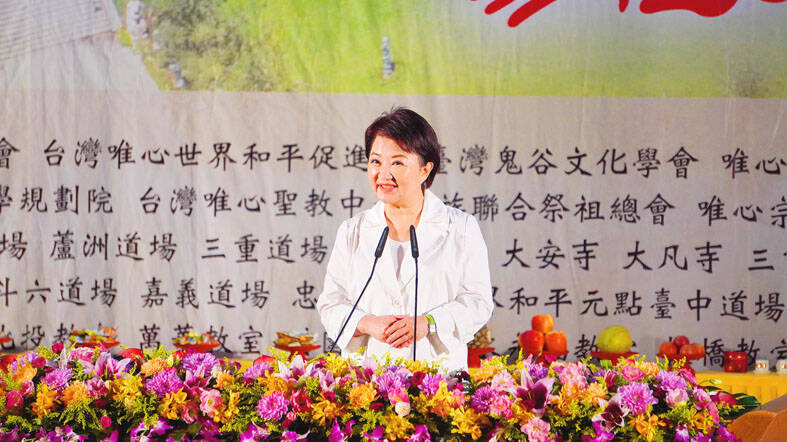Taichung Mayor Lu Shiow-yen (盧秀燕) yesterday said she would not run for Chinese Nationalist Party (KMT) chair when Taichung “needs her the most” to deal with US tariffs.
Calling Washington’s 20 percent tariff on Taiwanese goods “a tsunami” for the country, Lu said Taichung is expected to be hard hit.
The city is home to many small and medium-sized companies, particular those in the machinery sector.

Photo: CNA
“Our economy is deteriorating [due to the tariffs], and therefore I have to stand guard with our businesses and our citizens, through the expected hardships ahead,” Lu told reporters in Taichung.
“At this most challenging moment, a mother will stay at home,” Lu said, referring to her nickname of “Mother Lu” due to her public image as a caring mother.
“This is my promise and I intend to keep it,” she said.
Lu made the comments in response to KMT Chairman Eric Chu’s (朱立倫) open support for her to succeed him, following the party’s latest victory defeating recalls against seven of its lawmakers on Saturday.
“I sincerely urge Mayor Lu Shiow-yen to run for the position of KMT chairperson and take on the weighty responsibilities of leading the party” on its return to power, Chu said on Saturday.
He also praised Lu for her “calm, pragmatic and warm leadership,” which showed she had the strength the KMT and Taiwan need.
The KMT is set to elect a new chairperson on Oct. 18, with candidate registration opening early next month.
Chu, who is leading the KMT for the second time since 2021, has said he has no intention to seek re-election.
Lu thanked Chu for his remarks, but said the KMT is a democratic party, and it would be “inappropriate” for an outgoing chair to name a successor or pick someone to join the chairmanship race.
“I will be there whenever the party needs me,” she added, without elaborating.
Lu, who would reach the two-term limit in December next year, is widely expected to seek the KMT’s leadership and run in the 2028 presidential election.

Taiwan has received more than US$70 million in royalties as of the end of last year from developing the F-16V jet as countries worldwide purchase or upgrade to this popular model, government and military officials said on Saturday. Taiwan funded the development of the F-16V jet and ended up the sole investor as other countries withdrew from the program. Now the F-16V is increasingly popular and countries must pay Taiwan a percentage in royalties when they purchase new F-16V aircraft or upgrade older F-16 models. The next five years are expected to be the peak for these royalties, with Taiwan potentially earning

STAY IN YOUR LANE: As the US and Israel attack Iran, the ministry has warned China not to overstep by including Taiwanese citizens in its evacuation orders The Ministry of Foreign Affairs (MOFA) yesterday rebuked a statement by China’s embassy in Israel that it would evacuate Taiwanese holders of Chinese travel documents from Israel amid the latter’s escalating conflict with Iran. Tensions have risen across the Middle East in the wake of US and Israeli airstrikes on Iran beginning Saturday. China subsequently issued an evacuation notice for its citizens. In a news release, the Chinese embassy in Israel said holders of “Taiwan compatriot permits (台胞證)” issued to Taiwanese nationals by Chinese authorities for travel to China — could register for evacuation to Egypt. In Taipei, the ministry yesterday said Taiwan

Taiwan is awaiting official notification from the US regarding the status of the Agreement on Reciprocal Trade (ART) after the US Supreme Court ruled US President Donald Trump's global tariffs unconstitutional. Speaking to reporters before a legislative hearing today, Premier Cho Jung-tai (卓榮泰) said that Taiwan's negotiation team remains focused on ensuring that the bilateral trade deal remains intact despite the legal challenge to Trump's tariff policy. "The US has pledged to notify its trade partners once the subsequent administrative and legal processes are finalized, and that certainly includes Taiwan," Cho said when asked about opposition parties’ doubts that the ART was

If China chose to invade Taiwan tomorrow, it would only have to sever three undersea fiber-optic cable clusters to cause a data blackout, Jason Hsu (許毓仁), a senior fellow at the Hudson Institute and former Chinese Nationalist Party (KMT) legislator, told a US security panel yesterday. In a Taiwan contingency, cable disruption would be one of the earliest preinvasion actions and the signal that escalation had begun, he said, adding that Taiwan’s current cable repair capabilities are insufficient. The US-China Economic and Security Review Commission (USCC) yesterday held a hearing on US-China Competition Under the Sea, with Hsu speaking on